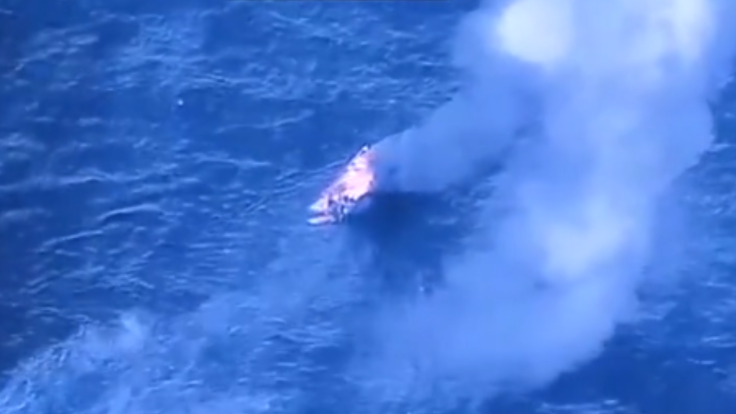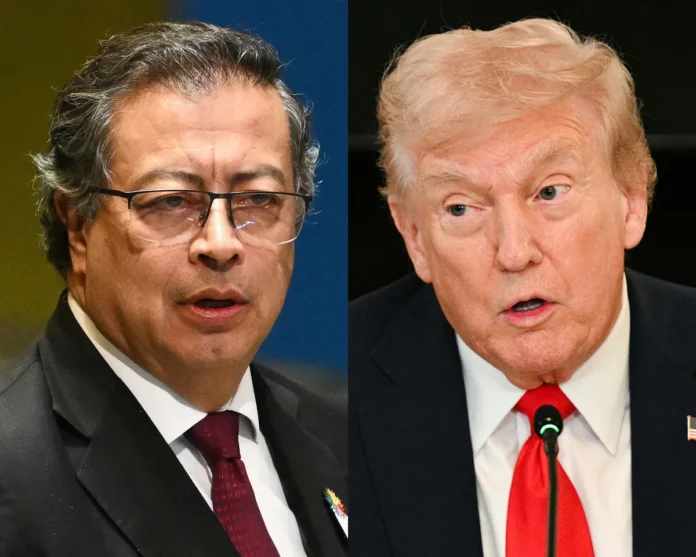Tensions Rise After U.S. Strike in the Caribbean
Colombian President Gustavo Petro has accused the United States of attacking a Colombian vessel and killing citizens of his country in a recent airstrike. The White House has firmly rejected the claim, labeling it “baseless and unfounded.”
The U.S. military has carried out at least four strikes in the Caribbean Sea in recent weeks, reportedly destroying vessels it says were linked to drug trafficking operations. According to U.S. officials, these operations took place in international waters and were part of ongoing efforts to disrupt narcotics smuggling networks.
However, no official proof or details have been shared about the identities of those on board the targeted boats, raising serious questions across Latin America about the legality and justification of these attacks.
Petro: “The Boat Was Colombian, With Our People On Board”

President Petro, speaking via his official X (formerly Twitter) account, said the most recent vessel destroyed by the U.S. military was “Colombian with Colombian citizens inside.”
“I hope the families of those aboard come forward and speak out,” Petro wrote. “This is not a war against smuggling; it is a war for control over oil and resources. The aggression affects all of Latin America and the Caribbean, and it must be stopped.”
Petro went on to describe the situation as a “new war scenario” emerging in the Caribbean, warning that the strikes could escalate tensions in the region and threaten stability.
While Petro has not yet provided concrete evidence or the identities of the victims, his remarks have sparked diplomatic friction between Bogotá and Washington.
U.S. Dismisses Allegations, Reaffirms Cooperation with Colombia

In response, the White House issued a statement strongly denying Petro’s accusations. The statement read:
“The United States looks forward to President Petro publicly retracting his baseless and reprehensible statement.”
Despite the tension, the White House emphasized that the two nations continue to share longstanding security and anti-narcotics partnerships.
“While our countries may have policy differences, the United States remains committed to close cooperation on shared priorities such as regional security, counter-narcotics, and stability,” the statement added.
Regional Leaders Demand Clarity Over U.S. Military Actions
Speaking at the EU Global Gateway Forum in Brussels, President Petro announced that he had requested an emergency meeting of Caribbean foreign ministers to address the U.S. strikes.
“The region deserves transparency,” he said. “We cannot allow the Caribbean to become a theater of war under the pretext of fighting drug trafficking.”
Petro’s comments follow growing criticism from several Latin American governments, who have accused the U.S. of violating international law and conducting unauthorized military operations in shared waters.
U.S. Senate Rejects Motion to Limit Trump’s Military Powers
The controversy comes shortly after the U.S. Senate voted against a measure that would have restricted President Donald Trump from ordering further military action in the Caribbean.
The proposal, introduced by Democratic Senators Adam Schiff and Tim Kaine, sought to require congressional approval for any future strikes. The motion failed narrowly in a 48–51 vote, largely along party lines.
Senator Schiff had argued that such operations risked escalating conflicts in the region and undermining congressional oversight of military power.
President Petro later responded to Schiff’s post on X, expressing concern that the U.S. government was “opening a new warfront in the Caribbean.”
Washington Cites ‘Armed Conflict’ Justification
A leaked memo sent to members of Congress earlier this month revealed that the U.S. now categorizes itself as being in a “non-international armed conflict” — a legal framing that allows the use of wartime powers.
Analysts believe this classification enables Washington to carry out lethal strikes on individuals deemed “enemy combatants,” even if they pose no immediate threat.
President Trump has previously designated several Latin American drug cartels — including groups in Mexico, Venezuela, and Ecuador — as terrorist organizations, granting the U.S. expanded military and intelligence authority to target them abroad.
Growing Calls for Transparency and Dialogue
Human rights organizations and regional observers have called for an independent investigation into the recent U.S. military actions. Critics argue that the absence of evidence regarding the alleged narcotics operations raises doubts about their legality.
Meanwhile, President Petro’s administration insists that Latin America must not be caught in a geopolitical struggle.
“The Caribbean should be a sea of peace,” Petro said. “We cannot allow the fight against drugs to become an excuse for new wars.”
As the dispute deepens, both Washington and Bogotá face mounting pressure to provide clarity and prevent the situation from escalating into a wider diplomatic crisis.

